|
 Yenko
Chevrolet and COPO 9561
Perhaps  the best know of the racing dealers is the best know of the racing dealers is  Don Yenko, from Cannonsberg, Pennsylvania. Don Yenko, from Cannonsberg, Pennsylvania.  Wanting more performance Wanting more performance  than the
396 Camaro would give, Yenko than the
396 Camaro would give, Yenko  Sportscars
created the Yenko Sportscars
created the Yenko Super Camaro by installing
the 427 cid 425 Super Camaro by installing
the 427 cid 425  hp engine. hp engine. 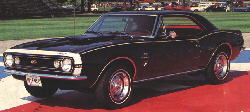 Yenko had been building
Corvair Yenko had been building
Corvair  Stingers, and some of the early Stingers, and some of the early  Yenko Camaros had Corvair Yenko Camaros had Corvair  window stickers with the window stickers with the  Camaro information typed in! Camaro information typed in!  These cars all had the special These cars all had the special  Yenko hood scoop and Yenko hood scoop and  Yenko emblems. Most of these early Yenko Yenko emblems. Most of these early Yenko  Camaros went to Camaros went to  Chicago, Chicago, where they were distributed by Span, Inc. for Yenko Sportscars.
where they were distributed by Span, Inc. for Yenko Sportscars.  There were 54 Camaros built in '67, There were 54 Camaros built in '67,  making this one of the rarest of Camaros. making this one of the rarest of Camaros.  There are only 12 surviving cars There are only 12 surviving cars  known, and 9 of those are being raced or are in
very bad condition. The known, and 9 of those are being raced or are in
very bad condition. The  car pictured above
belongs to Jim Parks, car pictured above
belongs to Jim Parks, and is the only know
'67 Yenko in showroom condition. and is the only know
'67 Yenko in showroom condition.
 By the end of 1967 By the end of 1967 it was clear that Yenko couldn't keep up it was clear that Yenko couldn't keep up  with the demand for 427 Camaros, with the demand for 427 Camaros, so he approached Chevrolet so he approached Chevrolet about the
about the possibility of getting factory
equipped possibility of getting factory
equipped  427 Camaros. 427 Camaros. Chevy was hesitant about this at first,
Chevy was hesitant about this at first, but the people in the Special
Projects Division were eager to give it a shot. but the people in the Special
Projects Division were eager to give it a shot.  According to Jim Mattison, According to Jim Mattison, who worked in the division at the time, the result was that Chevy agreed
who worked in the division at the time, the result was that Chevy agreed to supply factory equipped 427 Camaros to
to supply factory equipped 427 Camaros to  Yenko in 1968 on the condition
that he keep it a secret. Yenko in 1968 on the condition
that he keep it a secret.  Don Yenko agreed, and until recently it was Don Yenko agreed, and until recently it was  thought
that all 68 of the 1968 Yenko Camaros had dealer installed thought
that all 68 of the 1968 Yenko Camaros had dealer installed  engines,
just like the 67's, but they were actually engines,
just like the 67's, but they were actually  factory installed. At the end
of the 68 model year the cars factory installed. At the end
of the 68 model year the cars had proved to be both reliable and
desireable. had proved to be both reliable and
desireable.  This led to the birth of This led to the birth of  two special options for 1969, COPO 9561 and COPO
9737. two special options for 1969, COPO 9561 and COPO
9737.  
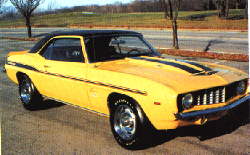  The Central Office Production Order The Central Office Production Order  (COPO) was a back door (COPO) was a back door  around
Chevrolet's performance around
Chevrolet's performance  limits. COPO 9561
was the limits. COPO 9561
was the  factory 427 cid Camaro, with either
435hp and solid lifters in the 4-speeds or 425hp and hydraulic lifters in the autos, factory 427 cid Camaro, with either
435hp and solid lifters in the 4-speeds or 425hp and hydraulic lifters in the autos,  and COPO 9737 was the Sport and COPO 9737 was the Sport  Car Conversion Kit, consisting Car Conversion Kit, consisting  of E70X15 tires on Rally Wheels, of E70X15 tires on Rally Wheels,  a 140 mph speedometer, and a 1 a 140 mph speedometer, and a 1 inch front stabilizer bar. The first COPO inch front stabilizer bar. The first COPO 9561 cars were delivered to Yenko 9561 cars were delivered to Yenko  Chevrolet in January, 1969. Cars Chevrolet in January, 1969. Cars  built through late May had a built through late May had a  Stewart Warner 970 custom service tachometer Stewart Warner 970 custom service tachometer with a special sending with a special sending  unit installed. unit installed. 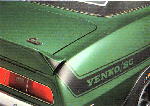 Later cars received the factory tach. Later cars received the factory tach.  Your Yenko could be ordered with or without Your Yenko could be ordered with or without  stripes and spoilers. The stripe package stripes and spoilers. The stripe package  included "SYC" decals on the front
headrests. included "SYC" decals on the front
headrests.
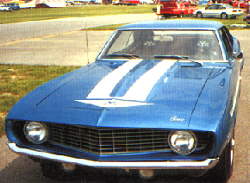  In 1969 the Yenco SYC could be In 1969 the Yenco SYC could be ordered with either the M22 4-speed
ordered with either the M22 4-speed  or the
Turbohydramatic or the
Turbohydramatic transmission for $4245.00, transmission for $4245.00,  which was a bargain for all which was a bargain for all  that performance! It is not known that performance! It is not known  exactly how many Yenko exactly how many Yenko  Camaros were made in 1969. The Camaros were made in 1969. The  best figure is either 199 or 201, best figure is either 199 or 201,  depending on the source, and probably 201. depending on the source, and probably 201.   Interestingly, there is a photo of Don Yenko
posing next Interestingly, there is a photo of Don Yenko
posing next  to a transporter full of Camaros with a handwritten
note reading to a transporter full of Camaros with a handwritten
note reading  "Our 350th Camaro!" Some people have
interpreted this to "Our 350th Camaro!" Some people have
interpreted this to  mean that Yenko sold at least 350 Camaros in 69, mean that Yenko sold at least 350 Camaros in 69,  but
there is no other evidence for this. but
there is no other evidence for this. We could add in the 54 cars from 1967 We could add in the 54 cars from 1967 and the 68 cars from 1968 and that still only equals 323 cars.
and the 68 cars from 1968 and that still only equals 323 cars.
 Since these cars could be ordered
by any dealer there Since these cars could be ordered
by any dealer there were many more COPO's
built for other dealers. were many more COPO's
built for other dealers. The best figures at
this time are 193 The best figures at
this time are 193  automatics automatics  and
822 4-speeds, for a and
822 4-speeds, for a total of 1015 COPO 9561
cars. total of 1015 COPO 9561
cars. 
 I have a friend who bought a
Yenko back in 1976, I have a friend who bought a
Yenko back in 1976, the same time I bought my
Z/28. the same time I bought my
Z/28.  At the time we didn't know what it
was, At the time we didn't know what it
was, but was it fast! We still didn't but was it fast! We still didn't know what it was when he sold it in 1980 know what it was when he sold it in 1980 for $1100 to someone from for $1100 to someone from  Sanford, NC. I've heard rumors that the Sanford, NC. I've heard rumors that the  car is now in Newton, NC, just car is now in Newton, NC, just  down the road from me, but I've never seen it. down the road from me, but I've never seen it. 
|
|
|
 Fred
Gibb and the ZL1
Just as DonYenko  and Dick Harrell were and Dick Harrell were  largely responsible for the COPO 9561 largely responsible for the COPO 9561 427 Camaros, Fred Gibb was the man 427 Camaros, Fred Gibb was the man behind COPO 9560, the aluminum behind COPO 9560, the aluminum block ZL1 427 Camaro. There were only block ZL1 427 Camaro. There were only  69 ZL1's built, and most went 69 ZL1's built, and most went  to racers. The cars carried a base price to racers. The cars carried a base price  of over $7,200, of over $7,200,  of which $4160.15 was for the engine! of which $4160.15 was for the engine! 
 Originally there were going to be
50 cars built, but Originally there were going to be
50 cars built, but other dealers clamored
for the car other dealers clamored
for the car  and that ran the total up to 69. These and that ran the total up to 69. These   cars were the ultimate factory cars were the ultimate factory Camaros,
Camaros,  and are very much sought after
today. and are very much sought after
today. It is ironic that Fred Gibb ended up shipping most
of his It is ironic that Fred Gibb ended up shipping most
of his 50 cars back to the factory to be 50 cars back to the factory to be  redistributed
to other dealers because he couldn't sell them at the asking price. redistributed
to other dealers because he couldn't sell them at the asking price.  Some
of the cars sat on the lot for 2 years or more before they were finally sold. Some
of the cars sat on the lot for 2 years or more before they were finally sold.
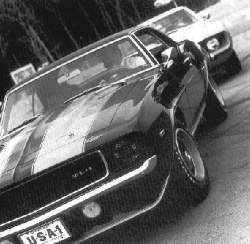  Chevrolet
toyed with the idea of Chevrolet
toyed with the idea of introducing the ZL1
as a regular producton introducing the ZL1
as a regular producton  option, and even
built two option, and even
built two prototypes with special graphics, prototypes with special graphics,  but decided against it. but decided against it.  There just wasn't a market for
a $7,200 Camaro in 1969! There just wasn't a market for
a $7,200 Camaro in 1969!
|
|





